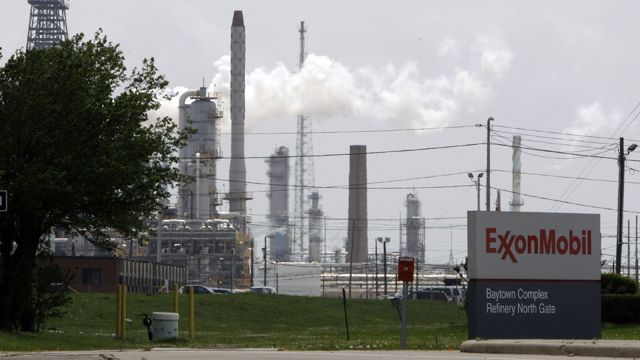
Earlier this month, we noted that shareholders were attempting to push ExxonMobil to recognize the importance of climate change and take into account the risks posed by a warming climate and possible regulations to it’s future business. But instead, the oil giant released a report saying that neither climate change nor a government response to it will affect the way the company does business — in part, because, according to Exxon’s assessment, it doesn’t seem likely that governments will take action to combat climate change during the next quarter century.
ExxonMobil’s response to shareholders was released on the same day that the UN’s Intergovernmental Panel on Climate Change published its latest report on how devastating climate change will be if we don’t take action to stop it soon.
A shareholder advocacy group called As You Sow was a major part of the push to get Exxon to address climate change. The group’s CEO, Andrew Behar, was in touch earlier this week and offered his take on the differing worldviews expressed in the ExxonMobil report and the IPCC report. “When you read the two reports side by side, [the] contrasts are stark,” he wrote.
Look at Exxon report page 1 where they state, “we are confident that none of our hydrocarbon reserves are now or will become ‘stranded.’ We believe producing these assets is essential to meeting growing energy demand worldwide, and in preventing consumers – especially those in the least developed and most vulnerable economies – from themselves becoming stranded in the global pursuit of higher living standards and greater economic opportunity.” On page 2 you see pictures showing how fossil fuels bring improved living standards to the poor around the world. This is their core premise, that demand will increase as they power the world to a brighter future.
This stands in stark contrast to the IPCC5 report (compiled by 830 authors from around the world and based on tens of thousands of scientific studies) and I quote from page 7, “People who are socially, economically, culturally, politically, institutionally, or otherwise marginalized are especially vulnerable to climate change.” And continuing on 12, “risk of death, injury, ill-health, or disrupted livelihoods in low-lying coastal zones… severe ill-health and disrupted livelihoods for large urban populations… breakdown of infrastructure networks and critical services such as electricity, water supply, and health and emergency services… mortality and morbidity during periods of extreme heat, particularly for vulnerable urban populations… food insecurity and breakdown of food systems… loss of rural livelihoods…”
The very people Exxon plans to lift out of poverty are in fact at the highest risk of becoming climate refugees. Two very different visions of the future that need to be reconciled.
This week, Tom Van Dyck, founder of As You Sow, appears on Moyers & Company to talk about divesting from polluting industries and reinvesting in companies committed to climate change solutions.

